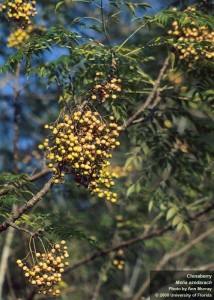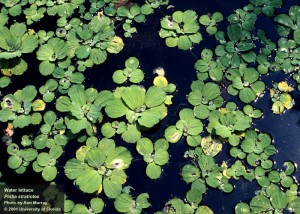Invasive Species of the Day Series (March 7th): Chinaberry & Water Lettuce
National Invasive Species Awareness Week: March 3rd – March 8th
March 7th: Chinaberry (Melia azedarach) & Water Lettuce (Pistia stratiotes):
Chinaberry: The Chinaberry tree has been around so long, you’d think it was a native instead of an invasive exotic plant. Introduced to America in the late 1700’s, the scent of its abundant light purple flowers defines Southern summer evenings. And what Southern child hasn’t gotten in trouble for deciding to throw the hard yellow berries at something?
It grows almost anywhere except wet places. If you cut it down or it blows over, it sprouts again. Although the seeds are toxic to humans and livestock, birds spread them from their perches on fences. Thunderstorms can snap the brittle wood and damage fences. Chinaberry defines the “weed tree”. It takes over neglected land and neither the wood nor the tree has much production value.
The best control is prevention, but escaped trees can be managed with “basal bark” and “cut stump” herbicide treatments. More information on these techniques is available at http://edis.ifas.ufl.edu/ag245. For additional assistance on identification and management of Chinaberry or other invasive species, contact your local UF IFAS Extension office.
For more information, contact the author Jed Dillard, Livestock & Forages Extension Agent 850-342-0187.
Water Lettuce: Water lettuce is a floating aquatic plant that resembles floating heads of lettuce. It can create large vegetative mats that can impede boat traffic, impact native plants and animals by eliminating habitat, food sources, sunlight and water flow.
Some speculate that the plant is a native, as it has been documented in Florida since the 1700’s. Others believe water lettuce arrived in Florida waters as a result of being released along with the ballast water of ships. It has been used in the aquarium trade and is available today. Water lettuce is listed on the Florida Exotic Pest Plant Council list as a category I, which means it can be invasive and disruptive to native plant and animal communities.
Water lettuce can be carried to other areas by boats, engines and trailers. Always make sure to rinse your boat, engine and trailer at the ramp to prevent the spread of water lettuce to other water bodies. Check out http://plants.ifas.ufl.edu/node/328 for indetification cards and control measures.
For more information, contact the author Chris Verlinde, Marine Science Agent 850-623-3868.


